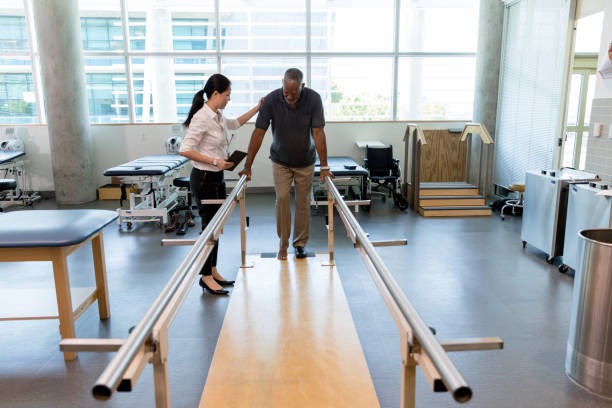Finding a physical therapist is important for your recovery or wellness goals, and you need someone suitable for your needs. With so many options, it can be confusing. Fortunately, with the right information and guidance, you can find a therapist who fits your requirements. Here are some key tips to help you find a qualified physical therapist nearby.
1. Understanding What Physical Therapy Is
Physical therapy focuses on promoting movement, reducing pain, restoring function, and preventing disability. Trained professionals, known as physical therapists, work through diagnosis and treatment to enhance physical functionality. Whether you have a sports injury or chronic condition or are recovering post-surgery, a skilled therapist can play an invaluable role in your rehabilitation journey.
2. Identify Your Needs
Before you kick-start your search, take a moment to identify your goals and needs for seeking therapy. Are you recovering from an injury, managing a chronic condition, or aiming to enhance your physical performance? Pinpointing your needs will not only help you communicate effectively with potential therapists but also aid in narrowing down your search to specialists who can best address your issues.
3. Consider Location and Accessibility
The convenience of reaching your therapist’s clinic is a significant factor. Look for practices closer to your home or workplace, as this will make it easier and more likely for you to attend frequent sessions. While proximity is key, also consider the clinic’s accessibility for individuals with mobility limitations and whether it provides adequate parking or has convenient public transport routes.
4. Research Potential Therapists
Once you have clarity on your needs and location preferences, start researching potential therapists. Check out websites, online platforms, and social media profiles to learn more about their practice, qualifications, and areas of expertise. Reading client reviews can offer valuable insights into others’ experiences and the therapists’ track records.
Verify Credentials
Ensuring your physical therapist has the required credentials is crucial. Look for licensing and additional certifications that indicate specialized training. Therapists often have certifications in areas like orthopedics, neurology, or sports therapy, which can be an advantage if you need targeted treatment.
5. Experience Matters, but Personality Counts Too
While a well-experienced therapist can offer expert solutions, you shouldn’t overlook the importance of a therapist’s personality and communication style. You will likely spend a significant amount of time with your therapist, so it’s essential to feel comfortable and understood. A therapist who listens patiently and is empathetic toward your needs is often invaluable.
6. Evaluate the Facility
Before finalizing your choice, it’s wise to visit the clinic and assess the facility’s environment. Look for cleanliness, state-of-the-art equipment, and a courteous staff dedicated to ensuring a welcoming experience. Observe if the environment reflects professionalism and care.
7. Consultation Sessions
Many therapists offer initial consultation sessions. Please take advantage of this opportunity to discuss your condition, ask about their treatment approach, and gauge whether their methods align with your comfort level and expectations. This session will also help solidify whether their practice is the ideal fit for you.
8. Insurance and Payment Options
Before moving forward, it’s essential to check whether the therapist accepts your insurance plan. Incompatible insurance plans can lead to expensive out-of-pocket expenses. Ask about payment options, potential financial assistance, or installment plans so you’re fully aware of the cost implications.
9. Get Recommendations
Word of mouth can be exceptionally powerful when seeking reliable services. Ask friends, family, or healthcare providers for recommendations. Personal testimonials offer real-time insight into a therapist’s style, professionalism, and effectiveness, making your choice easier.
Seek Physical Therapy in Close Proximity
Residents in proximity to bustling hubs are in luck, as accessing professional physical therapy in Salem has never been easier. Many practitioners cater to diverse needs, ensuring you can find tailored services without venturing far from your locale. Make sure to analyze the range of specialties offered by local professionals to match your health objectives.
10. Utilize Online Directories
Online directories specifically designed for healthcare providers allow you to filter searches based on location, specialty, and patient ratings. They provide a comprehensive overview of potential therapists, facilitating an easier comparison before making decisions. Utilize these platforms to your advantage and simplify the research process.
Discover the Best Around
Identifying the best physical therapy services involves understanding criteria like holistic treatment approaches, success rates, and continued patient satisfaction. If possible, don’t hesitate to ask potential therapists directly for detailed literature on past cases. Knowing other patients’ positive experiences is a solid indicator of quality.
11. Communicate Your Expectations
Clear communication is fundamental. From your first interaction, clarify your expectations and be straightforward about your health history and objectives. This openness ensures that your therapist crafts personalized treatment plans that cater explicitly to your needs.
If you’re searching for physical therapy near Salem, you’ll find several equipped facilities ready to accommodate different therapeutic needs. Whether you’re looking for outpatient services or more intensive therapy provisions, seek therapists who provide diverse options and demonstrate a comprehensive understanding of varying therapeutic requirements.
12. Check Availability and Flexibility
Timing can play a crucial role in how effective the therapy turns out to be. Check if the therapist can accommodate your schedule, offering sessions that fit easily into your commitments. Flexibility in hours also demonstrates a therapist’s dedication to providing accessible care for their clients.
13. Evaluate the Treatment Plan Approach
A transparent and well-detailed treatment approach can be reassuring and promote trust. Therapists should effectively explain each stage of potential treatment and the reasoning behind each method. Understanding this process helps patients stay engaged and motivated during therapy.
14. Assess Communication and Reporting
Regular communication and performance reporting are vital throughout therapy. Ask about the therapist’s preferred methods for progress reporting and ensure you’re comfortable with them. Continued tracking and updates facilitate a smoother and more interactive healing journey.
15. Keeping the Long-term Perspective
Finding a therapist involves more than just residential proximity or initial reimbursement compatibility. Consider if the therapist can support long-term wellness, offering guidance and lifestyle adjustments to prevent recurrence or injury. A therapist focused on long-term benefits signals a broader commitment to your health.
Final Thoughts
Choosing the right physical therapist involves a thoughtful evaluation of your needs, therapist qualifications, and logistical considerations. By following these guidelines, you can confidently find a professional who not only qualifies to provide restorative care but also aligns with your personal preferences and goals. Remember, it’s not merely about finding a physical therapist; it’s about establishing a valuable partnership that supports your journey toward improving health and wellness.




